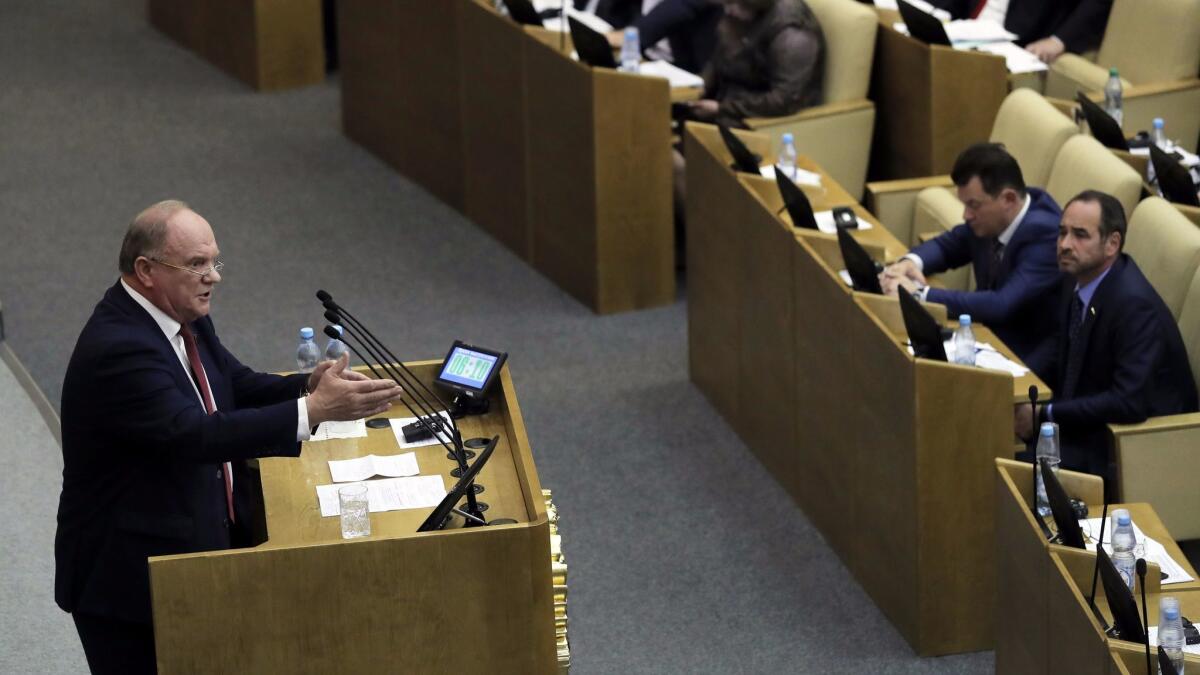Russia warns some news organizations to prepare to register as foreign agents

- Share via
Reporting from MOSCOW — The warning from the Russian Ministry of Justice said the Moscow bureau of U.S.-funded Radio Free Europe should prepare to register as a foreign agent, a move critics view as an attempt to limit free speech.
Editors and reporters at the broadcast news bureau read the emailed warning, looked up from their computers and quickly went back to work.
“We had been expecting something for a long time,” Ivan Martynenko, a reporter for the news outlet’s Russian-language website, Radio Liberty, said Thursday at Radio Free Europe’s newsroom in central Moscow.
The email arrived Wednesday night, but Russian politicians for months had been saying Radio Free Europe’s programs and website spread false or negative reports to try to harm Russia.
Then the U.S. Justice Department announced this month that it would require the Russian state-owned RT channel to register as a foreign agent. U.S. intelligence agencies have accused RT of involvement in alleged Russian interference in the 2016 presidential election, but Russia has denied meddling in the U.S. election.
The Justice Department’s action infuriated the Kremlin and left news outlets such as Radio Free Europe vulnerable to retaliation in the diplomatic tit-for-tat between Moscow and Washington.
The lower house of parliament, the State Duma, moved swiftly to pass amendments to its media law to require all foreign media reporting in Russia and funded from abroad to register as foreign agents.
Duma deputies behind the law made it clear that it was a retaliatory move against the Justice Department’s decision on RT. Parliamentary floor discussion over the proposed bill was sprinkled with a form of patriotism that has become the norm in modern Russia, after most of the Western world scorned President Vladimir Putin for the 2014 annexation of the Crimean peninsula in Ukraine.
“We didn’t want to approve this law, but we were made to,” said Pyotr Tolstoy, the Duma deputy who spearheaded the drafting of the legislation. “It’s not that all media will have to register as foreign agents. Today, we’ve given the Ministry of Justice a tool to pick organizations for precision strikes on certain media.”
Gennady Zyuganov, the leader of the Communist Party, said the U.S. decision regarding RT was the latest attack by the United States against Russia.

“The U.S. has always been jealous of the U.S.S.R.,” he said in a passionate floor speech in the Duma, using the acronym for the former Soviet Union. “We are the winners of seven wars!”
The new amendments to the media law are similar to a controversial 2012 Russian law, which requires nongovernmental organizations receiving funding from abroad to declare themselves as foreign agents, a term that during Russia’s history of intrusive state security apparatuses has led to stigmatization.
Dozens of civil society and human rights groups were forced to close because the law made funding too difficult. Those who continued to operate were required to produce detailed financial reports and adhere to other rules.
Critics said the foreign agent law was a Kremlin tool for crushing independent voices and civil society. Amnesty International, a human rights organization, warned in a statement Wednesday that a new law for foreign media registration risks damaging an already fragile freedom of speech in Russia.
“This legislation strikes a serious blow to what was already a fairly desperate situation for press freedom in Russia,” Denis Krivosheev, Amnesty International’s deputy director for Europe and Central Asia, said in a statement. “Over the last couple of years, the Kremlin has been tirelessly building a media echo chamber that shuts out critical voices, both inside Russia and from abroad.”
There are critics of the Justice Department’s decision to enforce the Foreign Agent Registration Act rules on RT. The law created in 1938 was designed to protect against Nazi propaganda. Since then, it has applied mainly to lobbyists working for foreign governments. Some government-funded media organizations have registered.
RT did register this week with the U.S. as a foreign agent under the auspices of its U.S.-based company, T&R Productions.
The Committee to Protect Journalists said in a statement that it opposed the U.S. Justice Department’s decision, suggesting it set a dangerous precedent.
“We’re uncomfortable with governments deciding what constitutes journalism or propaganda,” the statement said, quoting the group’s North America program coordinator, Alexandra Ellerbeck.
Nina Jankowicz, a fellow at the Kennan Institute at the Wilson Center, a think tank in Washington, said the U.S. should not allow Russians to dictate how the country implements its laws.
“All we’ve done is lend support to RT’s own narrative of ‘whataboutism’ and how [the U.S.] claim that we care about freedom of speech in Russia, and yet we are ‘stifling’ RT in America,” Jankowicz said.
By Thursday, the Russian Ministry of Justice released a statement saying nine media organizations, including Radio Free Europe and several of its subsidiary projects, and Voice of America, had been sent letters of warning that they have been selected as media that must register as a foreign agent once the law is passed.
CNN, which is a privately owned company, the British Broadcasting Co. and Germany’s Deutsche Welle are also considered possible targets for the registration requirement.
“I can’t say any of us were surprised at all to receive this letter, or surprised that we received it and it’s as confusing as it is,” said Yevgeniya Nazerets, the chief editor of Radio Liberty’s Russian language services in the Moscow bureau. “Even if we wanted to register now, there’s no regulations set up to do so. They can’t even say what documents we will need to present.”
After more than 20 years of working in Russia, Radio Free Europe and its projects, like Radio Liberty, have never hidden the fact that the organization is an American news agency, she said. “In fact, it’s our policy to introduce ourselves as such.”
It’s unlikely the new law will change how Radio Free Europe is perceived in Russia, where its staff and reporters are accredited with the Russian Foreign Ministry, just like other U.S. media working in Russia.
“It’s not very pleasant, or course, but on the other hand you can say that it’s almost a kind of professional acknowledgment,” Martynenko said. “It means that you do real journalism.”
Twitter: @sabraayres
Ayres is a special correspondent.
More to Read
Sign up for Essential California
The most important California stories and recommendations in your inbox every morning.
You may occasionally receive promotional content from the Los Angeles Times.











